托福听力对话习语讲解-可可英语20150720
- 格式:docx
- 大小:33.41 KB
- 文档页数:9
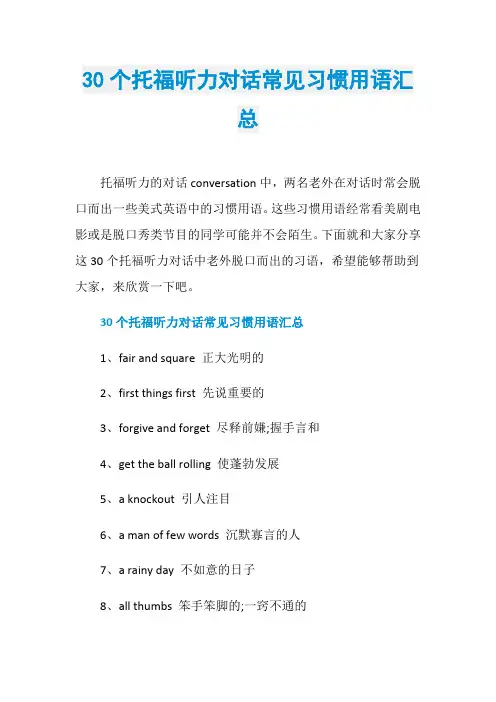
30个托福听力对话常见习惯用语汇总托福听力的对话conversation中,两名老外在对话时常会脱口而出一些美式英语中的习惯用语。
这些习惯用语经常看美剧电影或是脱口秀类节目的同学可能并不会陌生。
下面就和大家分享这30个托福听力对话中老外脱口而出的习语,希望能够帮助到大家,来欣赏一下吧。
30个托福听力对话常见习惯用语汇总1、fair and square 正大光明的2、first things first 先说重要的3、forgive and forget 尽释前嫌;握手言和4、get the ball rolling 使蓬勃发展5、a knockout 引人注目6、a man of few words 沉默寡言的人7、a rainy day 不如意的日子8、all thumbs 笨手笨脚的;一窍不通的9、ants in ones pants (skirt) 坐立不安10、as mod as sb. 与某人一样时髦11、a big shot = an important person 大腕儿,大亨12、a breath of fresh air 使人耳目一新的人13、Achilles’ heel 致命弱点;个性的瑕疵14、be all ears 洗耳恭听15、be all eyes 目不转睛16、a wet blanket 讨人嫌的人17、chip in = contribute money捐献,集资18、sell like hot cakes = sell very well or very quickly 畅销19、get butterflies in one’s stomach = get nervous 紧张不安20、two thumbs up 举双手赞成21、be the apple of one’s eye = be very precious to sb. 非常珍贵22、pull one’ s leg = tease someone 开某人玩笑23、break one’ s back 辛勤工作24、twenty-four seven = 24 hours a day, 7 days a week = all the time 永远,一直25、go for a song = be sold very cheaply 贱卖26、bucket down = rain very heavily 瓢泼大雨27、backroom boys 幕后英雄28、below the mark = not measure up 不够水平,不合格29、beyond compare 绝佳的,最棒的30、break even 不赔不赚托福听力:补充习语电影aisle seat--过道旁的座位go to the movies/go to a movie(冠词不可少)row--排音乐receive a standing ovation成语like peas and carrots--形影不离I’ll miss you twenty-four seven.(24 hours and 7 day)Break one’s leg--大获全胜With flying colors--大获全胜Leave sth. well alone/leave it at that不要画蛇添足人际gang up on sth.联合起来对付某人--They always gang up on me.Quite a person = somebody--是个人物Come to the point--进入正题Gild the lily.--多此一举Get out of the wrong side of the bed.--发脾气Go to bed with chickens--规律地睡眠Since you make your bed, you must lie on it.--= take one’s medicine--自食其果have a word with sb. about sth.--讨论问题have words with sb. about sth. --吵架I’d never get enough of it.--玩不够I’ve got enough of it.--受够了Don’t get me wrong.--别误会我Don’t get on my nerve.--别惹我心烦What a nerve--真不要脸I don’t have a nerve(heart).--没有勇气Spend money like water.Head over heels in love with sb.--拜倒在…--A good life is imspired by love and guided by knowledge.I was born in a dradon year.出生在龙年请客this is my treat.Let me treat you to sth.Let me pay the bill.The bill is on me.Go dutch--aa制Spilt the check.托福听力的背景材料:汞污染汞是在常温下一呈液态的金属元素。
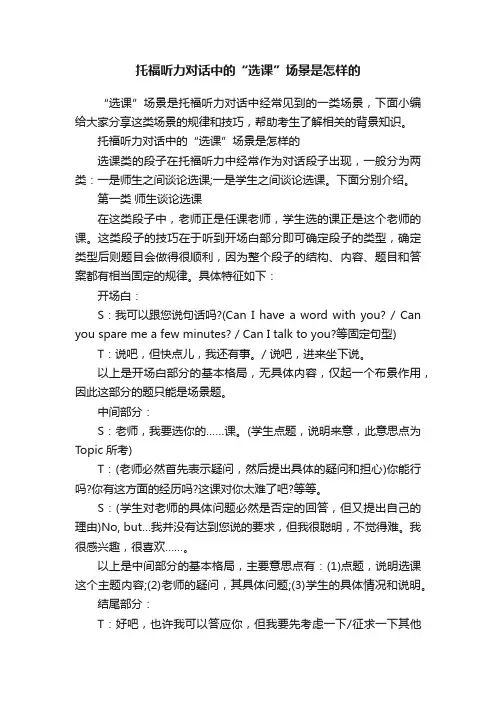
托福听力对话中的“选课”场景是怎样的“选课”场景是托福听力对话中经常见到的一类场景,下面小编给大家分享这类场景的规律和技巧,帮助考生了解相关的背景知识。
托福听力对话中的“选课”场景是怎样的选课类的段子在托福听力中经常作为对话段子出现,一般分为两类:一是师生之间谈论选课;一是学生之间谈论选课。
下面分别介绍。
第一类师生谈论选课在这类段子中,老师正是任课老师,学生选的课正是这个老师的课。
这类段子的技巧在于听到开场白部分即可确定段子的类型,确定类型后则题目会做得很顺利,因为整个段子的结构、内容、题目和答案都有相当固定的规律。
具体特征如下:开场白:S:我可以跟您说句话吗?(Can I have a word with you? / Can you spare me a few minutes? / Can I talk to you?等固定句型) T:说吧,但快点儿,我还有事。
/ 说吧,进来坐下说。
以上是开场白部分的基本格局,无具体内容,仅起一个布景作用,因此这部分的题只能是场景题。
中间部分:S:老师,我要选你的……课。
(学生点题,说明来意,此意思点为Topic所考)T:(老师必然首先表示疑问,然后提出具体的疑问和担心)你能行吗?你有这方面的经历吗?这课对你太难了吧?等等。
S:(学生对老师的具体问题必然是否定的回答,但又提出自己的理由)No, but…我并没有达到您说的要求,但我很聪明,不觉得难。
我很感兴趣,很喜欢……。
以上是中间部分的基本格局,主要意思点有:(1)点题,说明选课这个主题内容;(2)老师的疑问,其具体问题;(3)学生的具体情况和说明。
结尾部分:T:好吧,也许我可以答应你,但我要先考虑一下/征求一下其他老师的意见/先看一下你平时的成绩或以前的作品等等。
以上是结尾部分的基本格局,常考的主要意思点有:(1)老师在答复以前要干什么;(2)确定答复的时间;(3)学生的反应。
总之考的是谈话的最后结果。
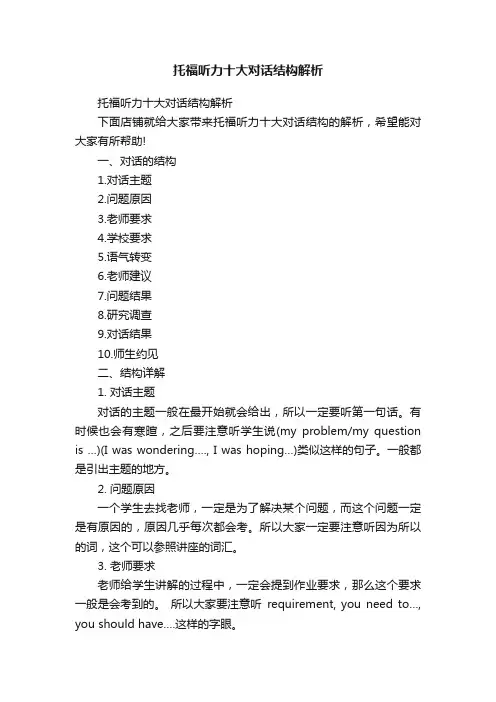
托福听力十大对话结构解析托福听力十大对话结构解析下面店铺就给大家带来托福听力十大对话结构的解析,希望能对大家有所帮助!一、对话的结构1.对话主题2.问题原因3.老师要求4.学校要求5.语气转变6.老师建议7.问题结果8.研究调查9.对话结果10.师生约见二、结构详解1. 对话主题对话的主题一般在最开始就会给出,所以一定要听第一句话。
有时候也会有寒暄,之后要注意听学生说(my problem/my question is …)(I was wondering…., I was hoping…)类似这样的句子。
一般都是引出主题的地方。
2. 问题原因一个学生去找老师,一定是为了解决某个问题,而这个问题一定是有原因的,原因几乎每次都会考。
所以大家一定要注意听因为所以的词,这个可以参照讲座的词汇。
3. 老师要求老师给学生讲解的过程中,一定会提到作业要求,那么这个要求一般是会考到的。
所以大家要注意听requirement, you need to…, you should have….这样的字眼。
4. 学校要求这个和上个类似,例如毕业的要求,住宿的要求,图书馆借书的`要求,都是肯定出考点,一定要注意听,特别是requirement等等的词汇。
5. 语气转变这个基本是定律了,语气转变类似于:Wow! You know what? Guess what? Actually…, To tell you the truth…, Listen….6. 老师建议老师的建议,解决方案是肯定会考到的。
7. 问题结果对话的第五题或者第四题,喜欢考对话的结果,就是这个问题是怎么处理的,是否成功等等。
8. 研究调查凡是对话中出现,调查,研究类似的信息,一定是会考的,而且会考,为什么要提到这些研究,大家以后记住,只要选支持主题的选项就可以了。
9. 师生约见10.额外信息这个考察的是结束对话后老师和学生约下次见面时间,有时候会说见面的内容,那么这个内容一般会考到。
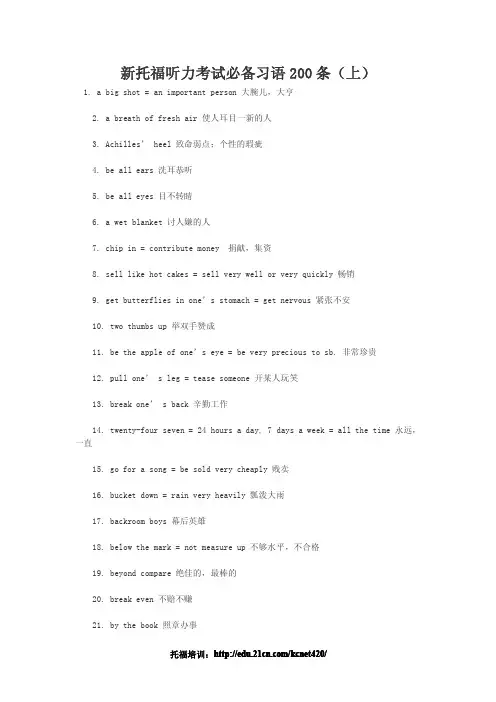
新托福听力考试必备习语200条(上)1.a big shot=an important person大腕儿,大亨2.a breath of fresh air使人耳目一新的人3.Achilles’heel致命弱点;个性的瑕疵4.be all ears洗耳恭听5.be all eyes目不转睛6.a wet blanket讨人嫌的人7.chip in=contribute money捐献,集资8.sell like hot cakes=sell very well or very quickly畅销9.get butterflies in one’s stomach=get nervous紧张不安10.two thumbs up举双手赞成11.be the apple of one’s eye=be very precious to sb.非常珍贵12.pull one’s leg=tease someone开某人玩笑13.break one’s back辛勤工作14.twenty-four seven=24hours a day,7days a week=all the time永远,一直15.go for a song=be sold very cheaply贱卖16.bucket down=rain very heavily瓢泼大雨17.backroom boys幕后英雄18.below the mark=not measure up不够水平,不合格19.beyond compare绝佳的,最棒的20.break even不赔不赚21.by the book照章办事22.cast a cloud over泼冷水,是蒙上阴影23.castles in the sky/air空中楼阁24.as clear as a bell非常清楚25.clear the air消除误会e to terms达成协议27.shed crocodile tears假装哭泣,假慈悲28.cut corners走捷径29.do’s and don’ts行为规范30.face the music面对现实31.fair and square正大光明的32.first things first先说重要的33.forgive and forget尽释前嫌;握手言和34.get the ball rolling使蓬勃发展35.a knockout引人注目36.a man of few words沉默寡言的人37.a rainy day不如意的日子38.all thumbs笨手笨脚的;一窍不通的39.ants in one's pants(skirt)坐立不安40.as mod as sb.与某人一样时髦41.at one's finger's tips了如指掌42.at sixes and sevens混乱的43.backseat driver指手划脚的人44.bite one's head off大发脾气45.black sheep不孝子女46.blow one's top怒发冲冠47.break one's neck痛打一顿;拼命做某事48.break the ice打破僵局;打破沉默49.bring down the house掌声雷动50.burn a hole in one's pocket花钱如流水51.buy your story相信你的话52.call it a day今天到此为止53.Capital idea好主意54.cold fish冷酷无情的人55.dark horse黑马;冷门56.daylight robbery价钱贵到离谱57.dear Jones letter绝交信58.dirty dog卑鄙小人59.eat one's words承认错误60.every Tom,Dick and Harry张三李四61.flat tire没精打采62.from A to Z从头到尾63.go on the horse快一点吧64.God knows天晓得65.gone with the wind随风而逝66.good for nothing毫无用处的67.Great minds think alike!英雄所见略同。
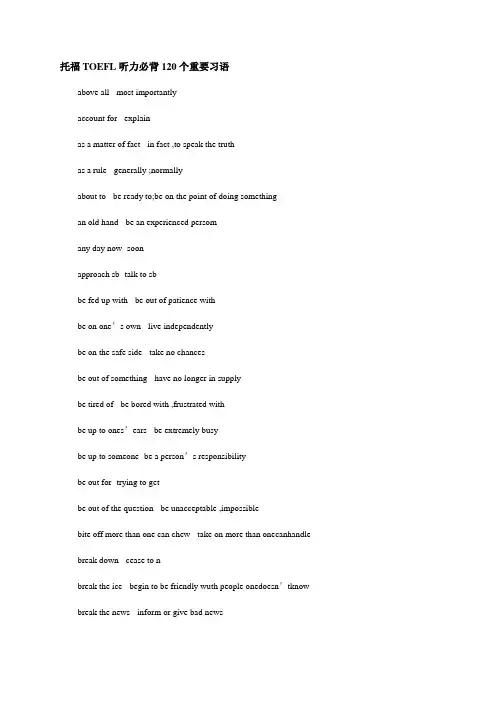
托福TOEFL听力必背120个重要习语above all - most importantlyaccount for - explainas a matter of fact - in fact ,to speak the truthas a rule - generally ;normallyabout to - be ready to;be on the point of doing somethingan old hand - be an experienced persomany day now -soonapproach sb -talk to sbbe fed up with - be out of patience withbe on one’s own - live independentlybe on the safe side - take no chancesbe out of something - have no longer in supplybe tired of - be bored with ,frustrated withbe up to ones’ears - be extremely busybe up to someone -be a person’s responsibilitybe out for -trying to getbe out of the question - be unacceptable ,impossiblebite off more than one can chew - take on more than onecanhandle break down - cease to nbreak the ice - begin to be friendly wuth people onedoesn’tknow break the news - inform or give bad newsbrush up on - imporve noe’s knowledge of somethingthroughstudy bump into - meet unexpectedlyby and large - in generalby heart - by memoryby all means - absolutely ,definitelyby no means - in no waycall off -cancelcheer up - be happycome down with - become sick withcome into -receive,especially after another’s deathcome up with - think ofcount on - depend uponcount out - eliminatedie down - become quiet ,become lessdo without - manage without somethingdrop by - visit informally; pay a short visitevery other - alternatefall behind - lag; fail to accomplish something on timefall through - fail to happen or be completedfar cry form - completely different from;a long wayfeel like - have a desire or wish forfeel up to - feel well enough to or be capabele of。
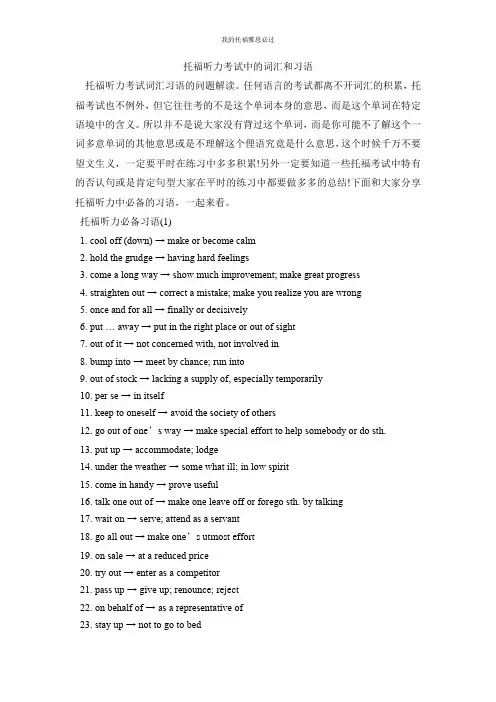
托福听力考试中的词汇和习语托福听力考试词汇习语的问题解读。
任何语言的考试都离不开词汇的积累,托福考试也不例外,但它往往考的不是这个单词本身的意思,而是这个单词在特定语境中的含义。
所以并不是说大家没有背过这个单词,而是你可能不了解这个一词多意单词的其他意思或是不理解这个俚语究竟是什么意思,这个时候千万不要望文生义,一定要平时在练习中多多积累!另外一定要知道一些托福考试中特有的否认句或是肯定句型大家在平时的练习中都要做多多的总结!下面和大家分享托福听力中必备的习语,一起来看。
托福听力必备习语(1)1. cool off (down) → make or become calm2. hold the grudge → having hard feelings3. come a long way → show much improvement; make great progress4. straighten out → correct a mistake; make you realize you are wrong5. once and for all → finally or decisively6. put … away → put in the right place or out of sight7. out of it → not concerned with, not involved in8. bump into → meet by chance; run into9. out of stock → lacking a supply of, especially temporarily10. per se → in itself11. keep to oneself → avoid the society of others12. go out of one’s way → make special effort to help somebody or do sth.13. put up → accommodate; lodge14. under the weather → some what ill; in low spirit15. come in handy → prove useful16. talk one out of → make one leave off or forego sth. by talking17. wait on → serve; attend as a servant18. go all out → make one’s utmost effort19. on sale → at a reduced price20. try out → enter as a competitor21. pass up → give up; renoun ce; reject22. on behalf of → as a representative of23. stay up → not to go to bed24. the odds are → the changes are; the probability is25. hold over → postpone26. out of order → in the wrong arrangement or condition; not working right27. booked up → have no seats or rooms left; have no free time left28. fit in → fine tine to see someone29. go in one ear and out the other → make no impression30. measure up → have the necessary qualifications31. change of pace → a temporary shift or variation in the normal routine or regular pattern of activity32. run out of → exhaust the quantity or supply of33. go by → follow; obey34. take it out on → cause someone else to suffer for one’s own misfortune or dissatisfaction35. get aro und to → find the necessary time for36. put out → disturb; annoy37. (with) flying colors 成功,以优异的成绩38. little by little 逐渐39. call off 取消40. come into 获得,继承41. put off 推迟42. stop by 顺便看望43. tie up 阻碍44. be out for 一心谋求,力图获得45. fill in for 代替46. turn down 拒绝;把音量关小47. go off 响起来48. cut down 减少49. come up with 想出,写出,提供出,找出50. make it 成功,到达目标。
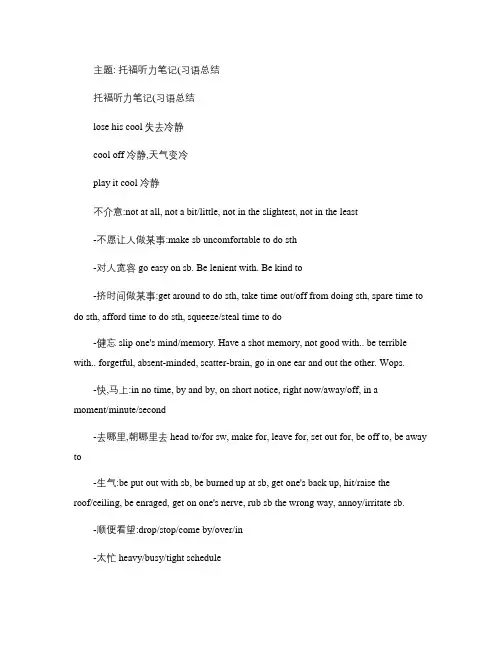
主题: 托福听力笔记(习语总结托福听力笔记(习语总结lose his cool失去冷静cool off 冷静,天气变冷play it cool 冷静不介意:not at all, not a bit/little, not in the slightest, not in the least-不愿让人做某事:make sb uncomfortable to do sth-对人宽容go easy on sb. Be lenient with. Be kind to-挤时间做某事:get around to do sth, take time out/off from doing sth, spare time to do sth, afford time to do sth, squeeze/steal time to do-健忘slip one's mind/memory. Have a shot memory, not good with.. be terrible with.. forgetful, absent-minded, scatter-brain, go in one ear and out the other. Wops.-快,马上:in no time, by and by, on short notice, right now/away/off, in amoment/minute/second-去哪里,朝哪里去head to/for sw, make for, leave for, set out for, be off to, be away to-生气:be put out with sb, be burned up at sb, get one's back up, hit/raise theroof/ceiling, be enraged, get on one's nerve, rub sb the wrong way, annoy/irritate sb.-顺便看望:drop/stop/come by/over/in-太忙heavy/busy/tight schedule-太热super/burning/blazing/unbearable/scorcher hot-听某人的建议:go by/follow/listen to one's suggestion-一点也不奇怪:no wonder. Little surprise.-有时,偶而:occasionally, sometimes, every so often, every now and them, every once in a while, at times, from time to time, on and off.-在某方面擅长:know the stuff/ropes/tricks/one's beans-逐步地:gradually, step by step, bit by bit, little by little, inch by inch , piece by piece, line by line, word by word.-bottom line 说话的核心,well, the bottom line is that…-check out①检查,询问②借书③出院④退房-come in handy 派上用场,会有用的-for the life of sb无论如何-get over: ①完成作业②病全愈③忘掉(不愉快-go through ①用完②检查③经历过④办手续-我认为I suspect, 我确认I bet, 我估计I expect, 我不认为I doubt, 我原以为I thought, 我原以为I was hoping, 我曾经是I used to be, 我本应该I was supposed to-on one's way 马上出发; on the way已经在路-pick up ①取东西②接人③买东西-put up ①挂起②住宿-up to :胜任:it's up to sb to do sth, sb is up to doing sth②熬夜sit/be up to do sth③达到up to sth托福听力笔记(听力句型总结-as…as…as cool as a cucumber, as fit as fiddle, as healthy as horse, as poor as a church mouse, as strong as an ox, as like as two peas(长得象,peas and carrots(形影不离,apples and oranges(大不相同,as proud as peacock, as changeable as moon, as punctual as a church clock, as sly as fox, as light as feather, as hungry as a wolf.-be the last thing +定从,最不希望的,最不需要的,最不愿意的。
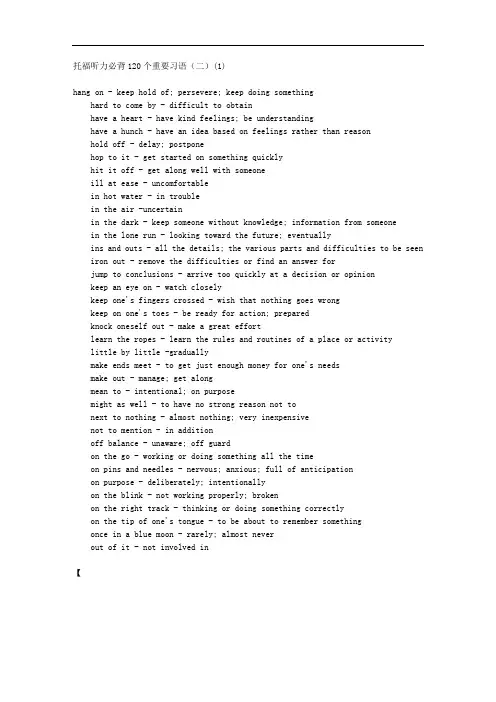
托福听力必背120个重要习语(二)(1)hang on - keep hold of; persevere; keep doing somethinghard to come by - difficult to obtainhave a heart - have kind feelings; be understandinghave a hunch - have an idea based on feelings rather than reasonhold off - delay; postponehop to it - get started on something quicklyhit it off - get along well with someoneill at ease - uncomfortablein hot water - in troublein the air -uncertainin the dark - keep someone without knowledge; information from someonein the lone run - looking toward the future; eventuallyins and outs - all the details; the various parts and difficulties to be seen iron out - remove the difficulties or find an answer forjump to conclusions - arrive too quickly at a decision or opinionkeep an eye on - watch closelykeep one's fingers crossed - wish that nothing goes wrongkeep on one's toes - be ready for action; preparedknock oneself out - make a great effortlearn the ropes - learn the rules and routines of a place or activitylittle by little -graduallymake ends meet - to get just enough money for one's needsmake out - manage; get alongmean to - intentional; on purposemight as well - to have no strong reason not tonext to nothing - almost nothing; very inexpensivenot to mention - in additionoff balance - unaware; off guardon the go - working or doing something all the timeon pins and needles - nervous; anxious; full of anticipationon purpose - deliberately; intentionallyon the blink - not working properly; brokenon the right track - thinking or doing something correctlyon the tip of one's tongue - to be about to remember somethingonce in a blue moon - rarely; almost neverout of it - not involved in【。
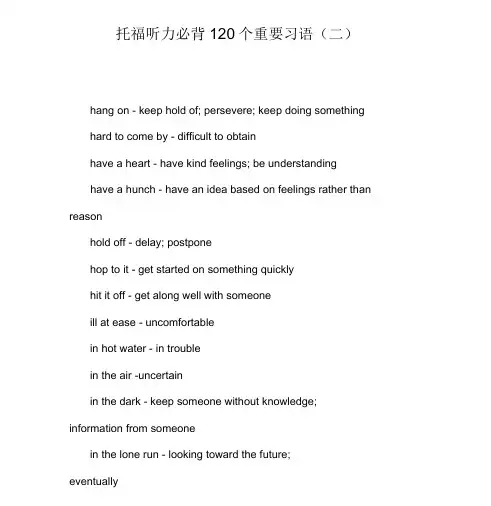
托福听力必背120个重要习语(二)hang on - keep hold of; persevere; keep doing something hard to come by - difficult to obtainhave a heart - have kind feelings; be understandinghave a hunch - have an idea based on feelings rather than reasonhold off - delay; postponehop to it - get started on something quicklyhit it off - get along well with someoneill at ease - uncomfortablein hot water - in troublein the air -uncertainin the dark - keep someone without knowledge; information from someonein the lone run - looking toward the future;eventuallyins and outs - all the details; the various partsand difficulties to be seeniron out - remove the difficulties or find an answer forjump to conclusions - arrive too quickly at adecision or opinionkeep an eye on - watch closelykeep one ' s fingers crossed - wish that nothinggoes wrongkeep on one ' s toes - be ready for action; prepared knock oneself out - make a great effortlearn the ropes - learn the rules and routines ofa place or activitylittle by little -graduallymake ends meet - to get just enough money for one ' s needs make out - manage; get alongmean to - intentional; on purposemight as well - to have no strong reason not tonext to nothing - almost nothing; very inexpensivenot to mention - in additionoff balance - unaware; off guardon the go - working or doing something all the timeon pins and needles - nervous; anxious; full of anticipationon purpose - deliberately; intentionallyon the blink - not working properly; brokenon the right track - thinking or doing something correctlyon the tip of one ' s tongue - to be about to remember somethingonce in a blue moon - rarely; almost neverout of it - not involved inpick up the tab - pay the bill or the cost of somethingpiece of cake - easyplay by ear - act spontaneously; without planningpill it off - accomplishpull one ' s leg - make fun of someone in a playful way; make someone believe something that is not true quite a few - manyraise the roof -angryright away - immediatelyrun for office - compete for an elected positionsave one ' s breath - to keep silent because talking would not achieve anythingsay that again - a saying that means; I agreecompletelystone ' s throw - short distancesearch me - an answer that means; I don ' t knowserves one right - is deserving ofsleep on it - think about something for a whilestraighten up - clean up; make tidytake a break - rest for a while; stop one ' s work or activitythink nothing of it - that ' s all rightthrow cold water on - discourage; lessen enthusiasm forto say the least - at the lowest estimatetouch on - mention a subject brieflyunder the water - not feeling wellwait around - waiting in vainwait on - attend as a servant; servewell worth the trouble - it deserves theinconvenience or troublewhole new ballgame - an entirely differentsituationwith flying colors - succeed very well without a hitch - without difficulty or delay。
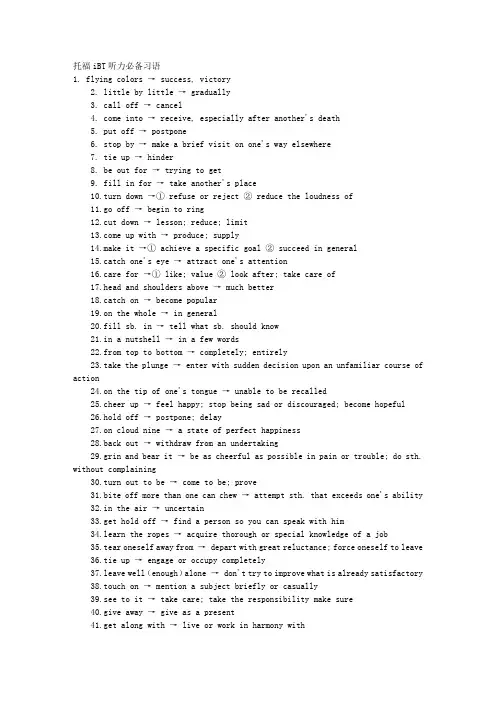
托福iBT听力必备习语1. flying colors → success, victory2. little by little → gradually3. call off → cancel4. come into → receive, especially after another's death5. put off → postpone6. stop by → make a brief visit on one's way elsewhere7. tie up → hinder8. be out for → trying to get9. fill in for → take another's place10.turn down →① refuse or reject ② reduce the loudness of11.go off → begin to ring12.cut down → lesson; reduce; limite up with → produce; supply14.make it →① achieve a specific goal ② succeed in general15.catch one's eye → attract one's attention16.care for →① like; value ② look after; take care of17.head and shoulders above → much better18.catch on → become popular19.on the whole → in general20.fill sb. in → tell what sb. should know21.in a nutshell → in a few words22.from top to bottom → completely; entirely23.take the plunge → enter with sudden decision upon an unfamiliar course of action24.on the tip of one's tongue → unable to be recalled25.cheer up → feel happy; stop being sad or discouraged; become hopeful26.hold off → postpone; delay27.on cloud nine → a state of perfect happiness28.back out → withdraw from an undertaking29.grin and bear it → be as cheerful as possible in pain or trouble; do sth. without complaining30.turn out to be → come to be; prove31.bite off more than one can chew → attempt sth. that exceeds one's ability32.in the air → uncertain33.get hold off → find a person so you can speak with him34.learn the ropes → acquire thorough or special knowledge of a job35.tear oneself away from → depart with great reluctance; force oneself to leave36.tie up → engage or occupy completely37.leave well(enough)alone → don't try to improve what is already satisfactory38.touch on → mention a subject briefly or casually39.see to it → take care; take the responsibility make sure40.give away → give as a present41.get along with → live or work in harmony with42.account for → explain43.out of print → no longer available for purchase from the publisher44.send out → distribute45.in no time → in a very brief time almost at once46.before long → soon; without much delay47.play by ear →① play an instrument without using written music; ② handlea matter without adequate preparation preparation or guidance48.wear and tear → loss or damage caused by usee what may → no matter what happens50.drop by → make a short or unplanned visit51.be short of → not having enough52.cut it out → stop doing sth.53.be sick of → be tired of ; having a strong dislike of54.look for a needle in a haystack (a bottle)→ search for sth. in a place where it is hopelessly lost55.knock oneself out → work very hard; make a great effort56.run up against → encounter57.far from → anything but; not at all58.far from it → by no means; not at all59.hang on to → hold tightly; keep firmly60.get nowhere → be unsuccessful; obtain no result61.day in and day out → every day; all the time62.break down → cease to function63.get going → get started; begin to move64.take one's time → not hurry65.boil down to → indicate, especially as a final judgment or analysis66.make up → take a test for the second time67.put up with → bear with patience; tolerate68.by and by → before long69.give someone a hand → help; assist70.ring a bell → sound familiar71.snap out of it →① change one's habits, attitude, etc, suddenly ② regain one's composure, energy, or good spirits; recover72.raise the roof → make trouble; start a fight or an argument73.get away with → escape without punishment74.on business → with definite work to do75.look up → search for, as an item of information, in a reference book76.let up →① cease; stop ② slacken; abate77.in any case (or event)→ no matter what happense out → be published79.look into → investigate; inspect80.spell out → explain very clearly or in detail81.fall back on → rely on82.wrap up → bring to an end, especially a successful conclusion83.save one's breath → keep silent because talking will not help84.hold up →① delay; hinder ② endure, last85.have one's hands full → be very busy; be able to do no more86.How come? → How is it? Why?87.stick around → stay or wait nearby88.make out → get along; manage89.turn up → appear, turn out, show up90.hold off → postpone; delay91.over one's head → beyond one's power to understand92.stock up → buy up; lay in a good supply of93.keep up → continue94.tie up → occupy completely95.in and out → coming in and going out often96.make ends meet → make one's income suffice without incurring debt97.on and on → without stopping98.out of this world → wonderful; great99.in a row →① in line; in alignment ② in succession; successively 100. wait around → waiting in vain备注说明,非正文,实际使用可删除如下部分。
1 / 9 目录 1. take a rain check 改天吧 ...................................................................................................... 1 2. lost count 弄不清楚 .............................................................................................................. 1 3. be in another world 精神恍惚;魂不守舍 .............................................................................. 2 4. make yourself at home 随意,随便 ...................................................................................... 2 5. save your breath 省口气吧;别白费口舌了 .......................................................................... 2 6. make sense 有意义,理解 ................................................................................................... 2 7. cost sb. an arm and a leg 非常昂贵 ...................................................................................... 3 8. burn a hole in one's pocket 很快地被花光 ............................................................................ 3 9. fill one's shoes 很好地顶替;令人满意地替代 ...................................................................... 4 10. is ice cold? 表示理所当然 ................................................................................................... 4 11. like apples and oranges 用来表示无法相比的事物: 截然不同,风马牛不相及 ....................... 4 12. look for a needle in a haystack 大海捞针 ............................................................................ 4 13. lose one's train of thought 忘记 .......................................................................................... 5 14. meet each other half way 相互妥协,让步 ......................................................................... 5 15. on the dot 准时;正点 ........................................................................................................ 5 16. once and for all 最后一次;干脆;彻底 .............................................................................. 6 17. out of earshot 不在听力所及范围 ........................................................................................ 6 18. out of this world 非常好 ...................................................................................................... 6 19. play by ear 随机应变,视情形而定 ..................................................................................... 7 20. ring a bell 令人想起某件事;听起来耳熟 ............................................................................ 7 21. share a common outlook 有共同的观点 .............................................................................. 7 22. six of one and half-a-dozen of the other 半斤八两;没什么区别 ......................................... 7 23. stick around 在附近逗留或等待 .......................................................................................... 8 24. stick with 继续做,坚持 ...................................................................................................... 8 25. straighten out 扯平;结清 .................................................................................................. 8
1. take a rain check 改天吧 —— Can you come over for dinner tonight? (今天晚上来吃饭好吗?) —— I'm up to my ears in work, so I'll have to take a rain check.(我工作很忙,改日吧。)
双语例句: I can't play tennis this afternoon but can I take a rain check? 今天下午我不能去打网球了,但是我能改期再去吗?
Can I take a rain check? ─ I must get this finished tonight. 下次吧, 好吗?今晚我得把这项工作做完。
I'm eager to meet Anna. But tomorrow's schedule is full. Can I take a rain check? 我真的很想认识安娜,可是我明天已经排满了事情,可不可改天再去?
2. lost count 弄不清楚 —— Ever since your girlfriend moved to Bridgeport, you are always driving there. How many trips a week do you make anyway?(自从你的女友搬到Bridgeport,你老是开车去看她。一周去几次啊?) —— I have lost count, but I can do it with my eyes closed.(搞不清楚了,但我闭着眼也能摸过去。)
双语例句: Leaders and ministers met and called so many times that I have lost count. 两国的领导人和部长之间还经常性会晤或打电话,次数之多,几乎数不清了。
托福听力对话习语讲解 时间: 2014-09-15 18:32:01 来源:可可英语 编辑:liekkas 2 / 9 I have bought so many new books these years that I've lost count of them. 这几年我买的书太多了,弄不清楚一共有多少本。
We lost count of how our money was spent. 我们弄不清楚我们的钱是怎么花的。
3. be in another world 精神恍惚;魂不守舍 —— Pete's really out of it these days.(Pete 这几天有点心不在焉。) —— Yeah, I know. Ever since he met Ann, he's been in another world.(我同意。自从他遇见Ann, 他就魂不守舍了。)
双语例句: She just sat and stared out of the window most of the time - she seemed to be in another world. 她大部分时间只是坐在那儿两眼盯着窗外——她似乎魂不守舍。
I don't think you even heard me, did you? You're in a world of your own. 我觉得你甚至都没听到我说什么,是不是?你心不在焉。
4. make yourself at home 随意,随便 —— Do you mind if I take off my jacket?(你介意我脱下夹克吗?) —— Of course not, make yourself at home.(当然不介意,随意一点!)